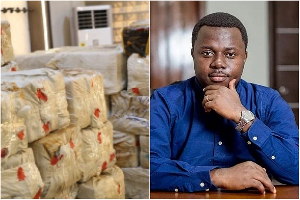This note has been a long time coming. So much so that were I not to make full use of the opportunity to vent out months of astriction, I would do myself a disservice. The most apt description I can think of to describe a retrospective look at the situation is the feeling of having a veil pulled over your eyes, perhaps akin to what it must be like everyday for a woman in a muslim nation. I must have been wearing a niqab for about 24 years.
I made the independent decision to leave my home country for 'Aburokyire' to get a graduate degree. While it was a choice I made freely and only too willingly, I cannot admit to it having been a comprehensive one or even a practical one. Barely crossed the one year mark being away and I cannot imagine the amounts of resolve people who spend years away from home must muster.
The first of many 'culture shocks' that the US throws at you is the fierce and almost combative claim people have on their independence and individualism. The feeling of constantly being in competition with others is a constant oppression even when it is not tangible what the prize is. I have to conclude that the constant sizing up is both a means and an end, it is a way for the individual to feel accomplished in the most rudimentary of ways if one can convince themselves on whatever incoherent level of a claim to superiority. From a distance, I had admired the trait of Westerns to go it alone, swim against the tide *add whatever other cliche fits here. Up close, it is a less than enviable quality. The culture makes reclusion a wonderfully attractive option, it also creates an easy route to marginalization and discrimination. And it is no wonder the extent to which those constructs are very poignant in the society.
I do not claim to be an extrovert, anyone who has met me would agree that I am more reserved than most. In the States however, I find that I have taken introversion to heights Freud might have been fascinated with. It is not the easiest thing to put in words, suffice it to say there is a difference between being alone and 'being alone'...if you are Ghanaian/Nigerian that's probably good enough for you by way of explanation.
Recently there was a short succession of suicides at my university during the mid-semester week of exams. Like everyone on campus I was greatly distressed for both the students and their families, but what mostly dawned on me was the fact that I could relate, I understood what could drive people to such lengths. That frightened me... that I understood. I am quite sure that I do NOT want to 'inadvertently' understand such things as motive for suicide.
Is the grass a greener shade and are the streets lined in gold in America? Most emphatically no, at least not from my personal experience thus far. In Ghana, I experienced lack and poverty but I have only been introduced to hunger since I have lived in the States. Ironic. To wake up hungry, take a shower and get on a bus, go about the day's tasks and come back home at night still hungry. The extent of financial hardship preventing the purchase of a single meal was a novel experience good ol' Yankee introduced me to.
The thing about being in a country that is not yours is the gradual stripping away of your sense of self-validation. I shall attempt to expatiate. We all have a sense of who we are, a story that you tell yourself about yourself. It's sort of an outline you expect to gain more substantive pages as you interact with the world around you. A problem arises when the story you have in your mind contradicts that which your experience portrays such that you have to strip off and rewrite the narrative. The average American is largely influenced by stereotypical thinking and unmotivated for the most part to expand their knowledge beyond the shores of their great land (in and of itself this is understandable, considering), so a foreign accent, idea or opinion elicits a reflex reaction of sorts. It is easy to begin to see one's self in a diminished capacity in accordance to what clouded lenses reflect.
I must say that it has not all been gloom and doom, 'abroad' has not been all rotten oranges, on the contrary the benefits have far outweighed the detriments in my mind. (Disclaimer: This is not to say that I shall not board my Kotoka flight with vim when the moment arrives). I have never felt more African than during the last year. It is as if the more invisibility society imposes the more of a counteract being able to identify and conform with my roots presents. It has been a sort of private defiance if you will. I have not done as much research into issues affecting my home country as I have since I have been here or felt a real sense of empowerment and belief in the ability of the individual to alter destiny. I have been unceremoniously stripped of my imbibed belief in the treasures of aburokyire that most people in Ghana just seem to believe without examination. It has been a most enlightening experience.
Oh, to delve into my new appreciation for family may take another note entirely. To summarize, they say you don't know what you have until it's gone and they must have sojourned to Yankee to arrive at such a revelation.
People, what is interesting is that I used to think I was alone in my experiences, I would say to myself "toughen up, the world is hard" and it is. But the kicker is that there are hundreds of international students who deal with the same issues. Even though my contact with fellow Ghanaian students in the States has been mostly limited to electronic communications, they always find a way to air their grievances. Lo and behold their struggles are mine, comments like "we dey inside", "small, small", "e go be" come up all too often. Most of the dreams we packaged and flew with us to JFK have become sand to gusty winds of disillusionment.
So then, to join the returnee wagon, or not? A very important young voice in the Ghanaian blogoshere Ms Esi Cleland seems to have retraced her steps with grand success, however countless others have not. The question in reality is not as cut and dry, investing one's time, money and self into an endeavour creates grey areas. Ultimately that choice must be made with the least damage to one's psyche.
Alas, this sad fate awaits thousands of the best and brightest from Africa who leave their home countries with stars in their eyes and lofty dreams in their hearts. I will not attempt to become immersed in a debate about brain drain or take a stand that people should not leave home to begin with. Because in my case it took leaving for me to get to the point I am at now.
Surely this is not the tale of every African immigrant but I believe it to be common enough in varying degrees perhaps to deserve a voice. And if African culture teaches anything it would be the value of community, there is indeed a strength in unity and I feel obliged to beat on the drums in recognition of this. If I must conclude with a morale to make this rant more cohesive and/or comprehensible, here are a few things the old folks say that capture the idea succinctly: "All that glitters is not gold" , "Sankofa".
**Afternote: I am not one for regrets and I believe that life is as much as about the journey as it is the destination. Therefore, I can only look forward to perils that make for a most enlightening adventure, but more and more the waves shake and break and carry me towards where I began. Efie ne fie...
Writer: Selali Onuoha (Marie Nkiru) Email: mno22@cornell.edu
Opinions of Wednesday, 14 April 2010
Columnist: Onuoha, Selali














